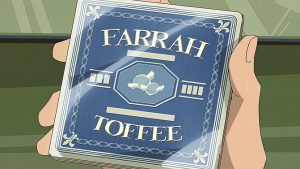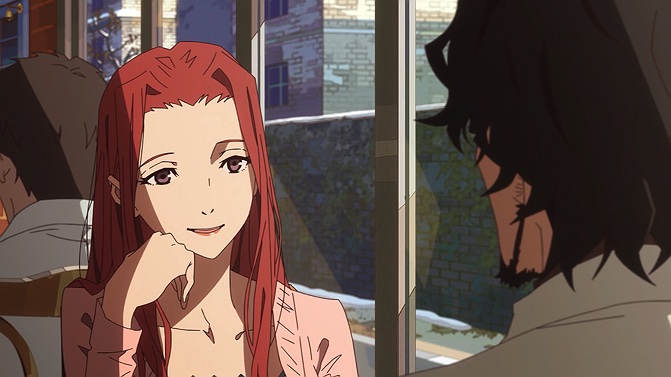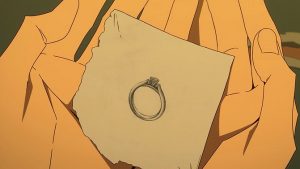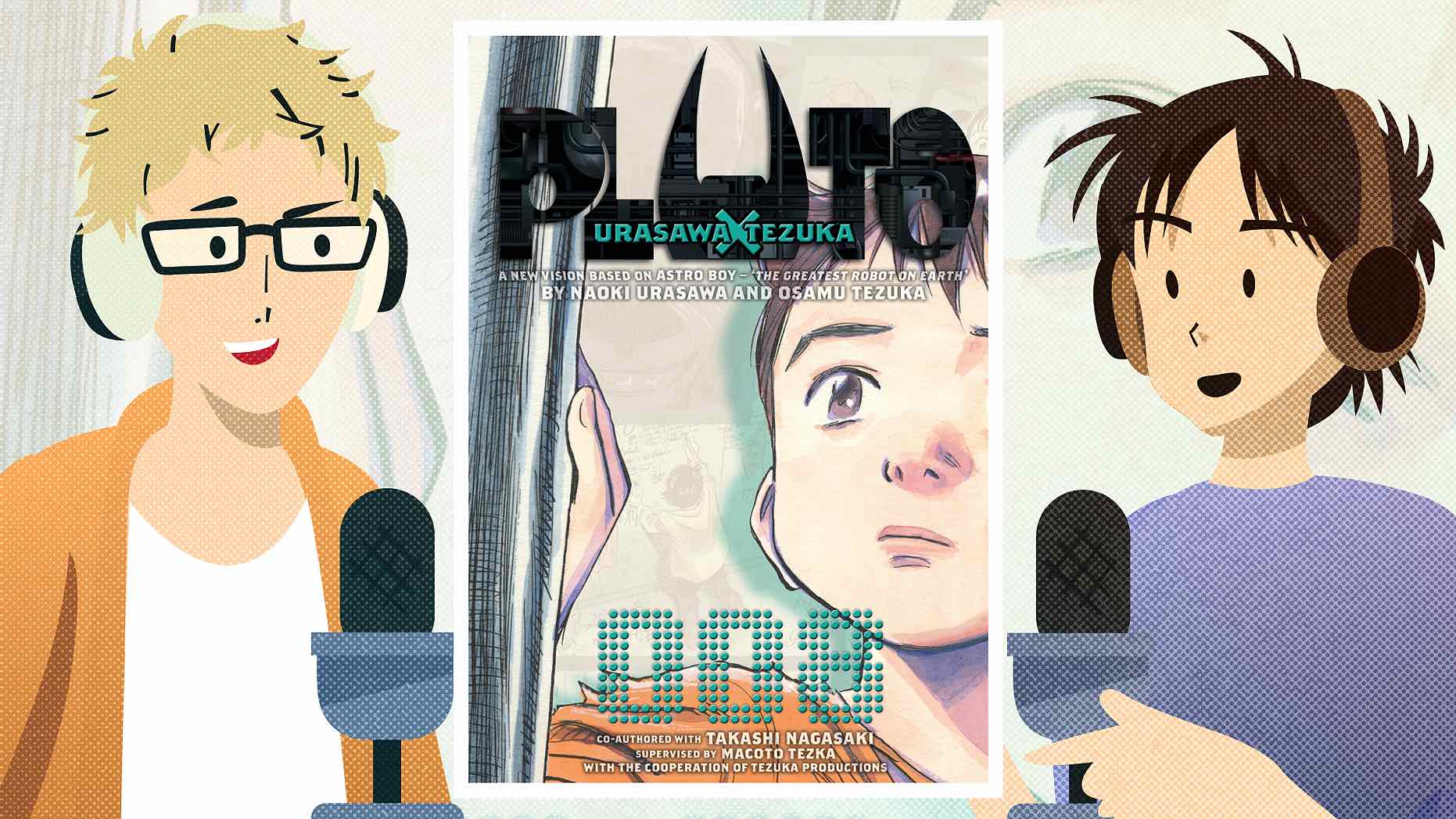 A full-fledged love story breaking out right in the middle of a caper series was not necessarily something I expected, but that’s what “Snow of London” has turned out to be. And it probably shouldn’t have surprised me, because doomed love scenarios are a core component of this genre, and Great Pretender is nothing if not faithful to the genre. Every arc has been so different, and this one has the feel of a tragedy to it – not reclaiming the past, but offering tantalizing hints about what might have been.
A full-fledged love story breaking out right in the middle of a caper series was not necessarily something I expected, but that’s what “Snow of London” has turned out to be. And it probably shouldn’t have surprised me, because doomed love scenarios are a core component of this genre, and Great Pretender is nothing if not faithful to the genre. Every arc has been so different, and this one has the feel of a tragedy to it – not reclaiming the past, but offering tantalizing hints about what might have been.
 Obviously I retract what I said about James Coleman not being abjectly a criminal as the first two villains were. Yes he is indeed pompous and prone to abuse his position, but he’s also a flat-out felon. Thomas’ talent was the inspiration for him to “revive” lost works of art and pass them off as real. In practical terms most of what he says is true, this scam would have a high chance of being successful. But that doesn’t change the reality of what it is. And for someone like Thomas, that’s something he has to live with (and eventually, he decides he can’t).
Obviously I retract what I said about James Coleman not being abjectly a criminal as the first two villains were. Yes he is indeed pompous and prone to abuse his position, but he’s also a flat-out felon. Thomas’ talent was the inspiration for him to “revive” lost works of art and pass them off as real. In practical terms most of what he says is true, this scam would have a high chance of being successful. But that doesn’t change the reality of what it is. And for someone like Thomas, that’s something he has to live with (and eventually, he decides he can’t).
 Is it ironic for Cynthia to break it off with Thomas because she can’t support his being part of a dishonest scam? As subtly as a sledgehammer. But of course, it’s clear that living through this had a lot to do with pushing Cynthia down the path she eventually chose. The romance between she and Thomas was obviously genuine – his drawing her am engagement ring because he was too poor to buy one was one of the most romantic things I’ve seen in anime for a long time. But that was then, this is now. She and Thomas have both profoundly changed – and they can never go back to being the same people they were.
Is it ironic for Cynthia to break it off with Thomas because she can’t support his being part of a dishonest scam? As subtly as a sledgehammer. But of course, it’s clear that living through this had a lot to do with pushing Cynthia down the path she eventually chose. The romance between she and Thomas was obviously genuine – his drawing her am engagement ring because he was too poor to buy one was one of the most romantic things I’ve seen in anime for a long time. But that was then, this is now. She and Thomas have both profoundly changed – and they can never go back to being the same people they were.
 Thomas made a bad choice to go along with Coleman’s scheme, though it’s easy to understand why he did it (and Cynthia lives with the guilt of that every day). He made a good choice to break it off, seeing one of his fakes in a museum being sketched the straw that broke the camel’s back. He got rich off the bad choice and two million Pounds (borrowed to buy back his fakes) in debt off the good one – life isn’t exactly fair. And now Makoto – as Cynthia’s liaison – is offering him a chance to clear his debt by painting another fake. Talk about pathos. The goal of “settling things” with James may be compelling, but it’s hard to imagine this being a path of redemption for anyone involved.
Thomas made a bad choice to go along with Coleman’s scheme, though it’s easy to understand why he did it (and Cynthia lives with the guilt of that every day). He made a good choice to break it off, seeing one of his fakes in a museum being sketched the straw that broke the camel’s back. He got rich off the bad choice and two million Pounds (borrowed to buy back his fakes) in debt off the good one – life isn’t exactly fair. And now Makoto – as Cynthia’s liaison – is offering him a chance to clear his debt by painting another fake. Talk about pathos. The goal of “settling things” with James may be compelling, but it’s hard to imagine this being a path of redemption for anyone involved.
 Indeed, as we segue into Episode 14 that’s more or less how things turn out. It’s a magnificent conclusion to this arc, but it raises an awful lot of questions that it doesn’t answer (which, for the record, is perfectly fine). For one, I’m struggling to grasp the significance of Makoto drawing the Edward VIII gachapon. He was part of one of the storybook romances of all-time, abdicating the British throne to marry the woman he loved, American divorcee Wallis Simpson. He was also, sadly, a lousy monarch and Nazi sympathizer. I’m not sure how any of that relates to Makoto or his role specifically in “Snow of London” though. Perhaps the next arc will answer that.
Indeed, as we segue into Episode 14 that’s more or less how things turn out. It’s a magnificent conclusion to this arc, but it raises an awful lot of questions that it doesn’t answer (which, for the record, is perfectly fine). For one, I’m struggling to grasp the significance of Makoto drawing the Edward VIII gachapon. He was part of one of the storybook romances of all-time, abdicating the British throne to marry the woman he loved, American divorcee Wallis Simpson. He was also, sadly, a lousy monarch and Nazi sympathizer. I’m not sure how any of that relates to Makoto or his role specifically in “Snow of London” though. Perhaps the next arc will answer that.
 The ethical and moral elements of this arc were much subtler than the first two, and I’d even go so far as to extend that to Coleman. It certainly can’t be denied that he behaved despicably towards Farrah, so I was glad to see Laurent tweak things to take James’ money, and not hers. She was very lucky she had a “butler” so completely loyal to her. Tim (Nakamura Shougo) obviously considered himself much more than that after 35 years of service, but it’s not clear Farrah did until the reality of how much he’d done to save her ass(ets) came into focus. Farrah was undeniably a victim in all this, but she wasn’t blameless.
The ethical and moral elements of this arc were much subtler than the first two, and I’d even go so far as to extend that to Coleman. It certainly can’t be denied that he behaved despicably towards Farrah, so I was glad to see Laurent tweak things to take James’ money, and not hers. She was very lucky she had a “butler” so completely loyal to her. Tim (Nakamura Shougo) obviously considered himself much more than that after 35 years of service, but it’s not clear Farrah did until the reality of how much he’d done to save her ass(ets) came into focus. Farrah was undeniably a victim in all this, but she wasn’t blameless.
 The objective value of a piece of art has always been a matter of some vexation to me. Who’s to say, really, what a piece of art is or should be worth? Any painting is as rare as it’s possible to be – it’s the only one in the world. Makoto’s act of switching Thomas’ fake with the real one was satisfying to me on so many levels (and I don’t think Laurent was especially surprised). It was a tribute to Thomas, to be sure, but what’s more – what difference does it really make? The 100 million pounds is still theirs. It’s not as though Sebastien and Marie could have sold the real one even if they had it. And Coleman, in his sick way, does have one honest trait – he actually does love art. And that painting. He sacrificed his business and his wealth for it, so why shouldn’t he have the real one? He still paid 70 million too much for it. It was a very Makoto thing to do – a quixotic gesture towards doing the legitimate thing at the close of a masterful con.
The objective value of a piece of art has always been a matter of some vexation to me. Who’s to say, really, what a piece of art is or should be worth? Any painting is as rare as it’s possible to be – it’s the only one in the world. Makoto’s act of switching Thomas’ fake with the real one was satisfying to me on so many levels (and I don’t think Laurent was especially surprised). It was a tribute to Thomas, to be sure, but what’s more – what difference does it really make? The 100 million pounds is still theirs. It’s not as though Sebastien and Marie could have sold the real one even if they had it. And Coleman, in his sick way, does have one honest trait – he actually does love art. And that painting. He sacrificed his business and his wealth for it, so why shouldn’t he have the real one? He still paid 70 million too much for it. It was a very Makoto thing to do – a quixotic gesture towards doing the legitimate thing at the close of a masterful con.
 As for Cynthia, I never really thought she and Thomas would get back together. Too much water has passed under the bridge for that, and they’re not the same people they were when they were in love. She got some closure at least – Coleman has been screwed (that auction was tense, but she was going to extract every Shilling she could out of him), Thomas is out of debt, and the two of them have made their peace. Of course Laurent was behind the whole thing – that’s what he does, manipulate everyone else’s lives from behind the scenes. But we may be reaching the point where he’s going to have to face down his own past, including the woman named Dorothy whose jewel he’s been wearing around his neck since the premiere.
As for Cynthia, I never really thought she and Thomas would get back together. Too much water has passed under the bridge for that, and they’re not the same people they were when they were in love. She got some closure at least – Coleman has been screwed (that auction was tense, but she was going to extract every Shilling she could out of him), Thomas is out of debt, and the two of them have made their peace. Of course Laurent was behind the whole thing – that’s what he does, manipulate everyone else’s lives from behind the scenes. But we may be reaching the point where he’s going to have to face down his own past, including the woman named Dorothy whose jewel he’s been wearing around his neck since the premiere.
 All in all “Snow of London” was pretty great, which of course “Los Angeles Connection” and “Singapore Sky” were too, and it was as different from those as they were from each other. Interestingly each successive arc so far has been less madcap and more personal than the one before, and each con less convoluted. All of that fake art by imaginary artists seemed so real, and that’s a tribute to the care and skill that goes into Great Pretender. If indeed Laurent is the focus of the next arc (Shanghai, apparently) that has the potential to be the darkest and most morally ambiguous story yet.
All in all “Snow of London” was pretty great, which of course “Los Angeles Connection” and “Singapore Sky” were too, and it was as different from those as they were from each other. Interestingly each successive arc so far has been less madcap and more personal than the one before, and each con less convoluted. All of that fake art by imaginary artists seemed so real, and that’s a tribute to the care and skill that goes into Great Pretender. If indeed Laurent is the focus of the next arc (Shanghai, apparently) that has the potential to be the darkest and most morally ambiguous story yet.



























































Ngai
June 30, 2020 at 7:15 pmI’m a little confused why Coleman had to sell the Snow of London back to himself through Farrah after he bought it for £20,000? I’m guessing just for the prestige of auctioning and selling it? Then why did Farrah chicken out? If Coleman was the owner of the painting, then it would have paid directly to him and he could just repay Farrah?…
Guardian Enzo
June 30, 2020 at 10:58 pmI assume he just figured it was an easy 20 million, so why not cash in? Cynthia interfering with his plans was unexpected but as to why they didn’t just prearrange to have Farrah pay whatever and have him pay her back, that’s a good question.
tsirrus
August 31, 2020 at 12:25 amMy guess is vanity.
He was as much in love with his own reputation than he was with art. He wanted the world to see the value of the painting he discovered. The simple sell with Farrah wouldn’t have been enough.
To me it’s also why he despises the mafia auction: it’s done in secret.
Happy to see the series hit Netflix internationally. As great a series as lauded.
Guardian Enzo
August 31, 2020 at 9:47 amI know he’s a big-time asshole and totally dishonest, but I find him a fascinating anti-hero. He’s actually quite talented, both as an appraiser and an actor, and if he wasn’t so vain and greedy could have been quite successful and happy on the up-and-up.
MFF
July 5, 2020 at 12:59 am“For one, I’m struggling to grasp the significance of Makoto drawing the Edward VIII gachapon.”
A monarch to reined for under a year before he was abdicated from the throne – Makoto, led a caper for a day which ended in abject failure and ceded control of the caper to Cynthia.
That was my interpretation, after googling Edward VIII.
LJ S.
November 2, 2020 at 2:55 pmSo, forgive me if this is a bit late, but I just finished Snow of London today.
I must say that I too am genuinely curious about the gachapon. Though, there was a connection I started to make after reading about Edward, and rewatching it all. In a somewhat blunt manner, Thomas stands in stark contrast the Edward VIII. While Edward found someone he loved, and made a massive sacrifice to be with her, Thomas had someone, but chose to chase a life of materialistic self-indulgence, which ultimately lead to Cynthia leaving him. Edward was a man that chose to stay true to himself, while Thomas chose to give up who he truly wanted to be, choosing to instead attempt to fulfilling the grandiose expectations of Coleman.
Guardian Enzo
November 2, 2020 at 5:52 pmIn hindsight I really feel like this was the strongest arc. Such a subtle story.
Justin Dupre
November 20, 2020 at 7:20 pmFor the gachapon, I believe it’s the theme of giving up the one with status, that most thought he should take, for the one with the feelings and heart and soul, which has more meaning to him, as Makoto expressed at the end. That the love was worth more than the status.